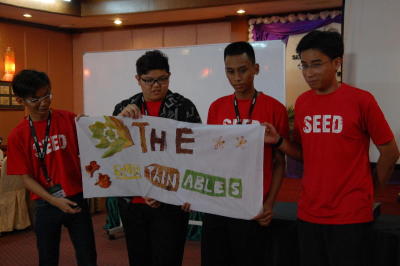By DENIELLE LEONG and SATHESH RAJ
Photos by DENIELLE LEONG
brats@thestar.com.my
WHEN two BRATs found out that they were going to Kota Kinabalu (KK), Sabah, for an event that aims to expose Gen Y to environmental issues in greater detail, they were rather skeptical at first.
These haze-stricken Peninsula kids genuinely thought they’d seen it all – but Sustainable, Environment and Eco-System Development (SEED) Malaysia 2014 proved to them that the predicaments faced by the Land Below The Wind are a totally different ballgame.
The four-day programme consisted of two parts: the Youth Eco Project, a workshop attended by students from eight Sabahan tertiary universities; and the SEED Conference, which featured a great line-up of speakers, including The Greenest Man On The Planet, Matthias Gelber.
Sure, Sabah is still very much blessed with its abundance of natural resources. In fact, the state’s clear waters and untouched rainforests are some of the major driving factors for its successful tourism industry. However, when nature becomes a source of income, there’s bound to be a struggle to strike a balance between economic growth and Mother Nature’s well-being.
At the Youth Eco Project closing ceremony, Assistant Minister of Tourism, Culture and Environment Datuk Pang Yuk Ming revealed that tourism activities can be a big threat to the sustainability of Sabah’s flora and fauna, like the fireflies.

“Fireflies lay their eggs in the river banks; and when speedboats go back and forth frequently, it can destroy the fireflies’ nests,” he said, adding that the ministry is currently working on enforcing guidelines for boat operators to protect their firefly population.
If action is taken quickly, not only will the eco-system be jeopardised, tourism revenue could also suffer.
“With the influx of tourists, the danger of them not being able to see what they had come to appreciate is becoming real,” said Professor Ghazally Ismail in his speech at the conference.
The revered biologist also introduced many “bizarre” creatures that can only be found in Sabahan forests – with cartoony names such as the Ninja Slug and Zombie Ants – to remind his audience of what Sabah and the world is at risk of losing.
But there’s no denying that the planet has already suffered a certain degree of damage. So, the question is: what do we do about it now?
At Youth Eco Project, students were asked to come up with viable solutions for any cause of their choice. The best presentations came from teams Green Pulse of Universiti Malaysia Sabah (UMS), and ChicDidas and The Sustainables of Asian Tourism International (ATI) College.
Green Pulse pitched for further efforts to protect mangrove forests in KK – starting with Likas Bay – and it was a topic these students were no strangers to.
“Green Pulse is actually a group in UMS, under the Environmental Science department. Our main goal is to teach the campus about nature, and we also reach out to other places in Sabah to educate the public,” team leader Dalton Nicco, 20, said. “UMS is implementing the eco-campus concept, so, we always find ways to go green.”
The initiative proposed to go green by increasing awareness on the importance of mangrove forests, and later on, pursuing replanting efforts around the Likas Wetlands.
“We chose to focus on Likas Wetlands specifically (of all mangrove forests in Sabah) because it is the closest to KK, so, this one is more susceptible to pollution,” he explained.
The Environmental Science student also added that his team hopes its plan, together with efforts of other organisations, will help increase the population density in mangrove forests. Many organisations have also conducted replanting exercises for mangrove forests.
While it was heartwarming to see students speak with so much passion for the planet, the question is: are we doing enough? And since we’re always going to town about “spreading awareness,” do we even know enough to execute that plan?
Joy Jeana, 22, from ChicDidas – who gave a presentation on coral reefs – believes that the level of awareness in KK is “quite low” and that “there is a lot more to be done”. To tackle this very predicament, Isaac Joe Petol, 19, says the problem lies in the attitude of the people and their understanding of the issue.
“From what I see, a lot of people don’t know much about the environment. They just throw rubbish indiscriminately. It doesn’t really matter to them. They don’t have any sense of love for the environment,” he said.
His team The Sustainables zoomed in on recycling and reducing the use of plastic bags – so simple, yet it is such a difficult issue to overcome.
“We want to spread the message that there are ways to reduce its usage – if it’s a small purchase, you can always put it in your bag. Otherwise, always carry a shopping bag with you. It’s the little things that can help our planet,” Petol added.
Overall, it was clear that there is still so much to learn about going green, but what matters most was that SEED Malaysia 2014 took that leap to empower its young audience to be better citizens of Earth.
Even the orang hijau could concur. During an interview, Gelber said: “It is important that youngsters get inspired through such experiences, get empowered and get motivated and learn and experience and try out certain things, whether it is design, technology or science-related.”
After a successful inaugural run in Sabah, organisers of SEED Malaysia 2014 are looking forward to reaching out to other states across the nation.
To learn more about SEED Malaysia’s initiatives, visit www.seedmalaysia.com.my


Tell us what you think!